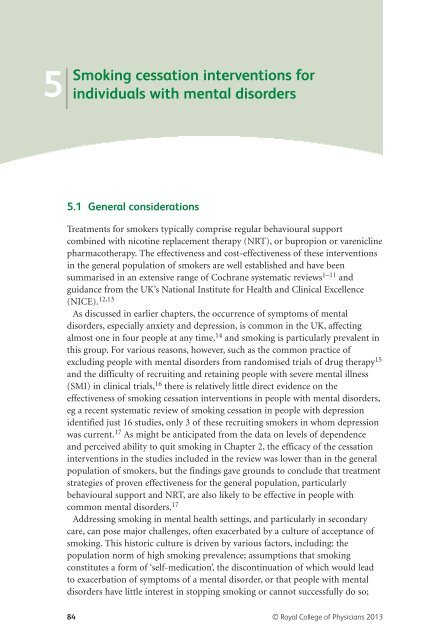Smoking and mental health - NCSCT
Smoking and mental health - NCSCT
Smoking and mental health - NCSCT
Create successful ePaper yourself
Turn your PDF publications into a flip-book with our unique Google optimized e-Paper software.
<strong>Smoking</strong> cessation interventions for<br />
5 individuals with <strong>mental</strong> disorders<br />
5.1 General considerations<br />
Treatments for smokers typically comprise regular behavioural support<br />
combined with nicotine replacement therapy (NRT), or bupropion or varenicline<br />
pharmacotherapy. The effectiveness <strong>and</strong> cost-effectiveness of these interventions<br />
in the general population of smokers are well established <strong>and</strong> have been<br />
summarised in an extensive range of Cochrane systematic reviews 1–11 <strong>and</strong><br />
guidance from the UK’s National Institute for Health <strong>and</strong> Clinical Excellence<br />
(NICE). 12,13<br />
As discussed in earlier chapters, the occurrence of symptoms of <strong>mental</strong><br />
disorders, especially anxiety <strong>and</strong> depression, is common in the UK, affecting<br />
almost one in four people at any time, 14 <strong>and</strong> smoking is particularly prevalent in<br />
this group. For various reasons, however, such as the common practice of<br />
excluding people with <strong>mental</strong> disorders from r<strong>and</strong>omised trials of drug therapy 15<br />
<strong>and</strong> the difficulty of recruiting <strong>and</strong> retaining people with severe <strong>mental</strong> illness<br />
(SMI) in clinical trials, 16 there is relatively little direct evidence on the<br />
effectiveness of smoking cessation interventions in people with <strong>mental</strong> disorders,<br />
eg a recent systematic review of smoking cessation in people with depression<br />
identified just 16 studies, only 3 of these recruiting smokers in whom depression<br />
was current. 17 As might be anticipated from the data on levels of dependence<br />
<strong>and</strong> perceived ability to quit smoking in Chapter 2, the efficacy of the cessation<br />
interventions in the studies included in the review was lower than in the general<br />
population of smokers, but the findings gave grounds to conclude that treatment<br />
strategies of proven effectiveness for the general population, particularly<br />
behavioural support <strong>and</strong> NRT, are also likely to be effective in people with<br />
common <strong>mental</strong> disorders. 17<br />
Addressing smoking in <strong>mental</strong> <strong>health</strong> settings, <strong>and</strong> particularly in secondary<br />
care, can pose major challenges, often exacerbated by a culture of acceptance of<br />
smoking. This historic culture is driven by various factors, including: the<br />
population norm of high smoking prevalence; assumptions that smoking<br />
constitutes a form of ‘self-medication’, the discontinuation of which would lead<br />
to exacerbation of symptoms of a <strong>mental</strong> disorder, or that people with <strong>mental</strong><br />
disorders have little interest in stopping smoking or cannot successfully do so;<br />
84 © Royal College of Physicians 2013














